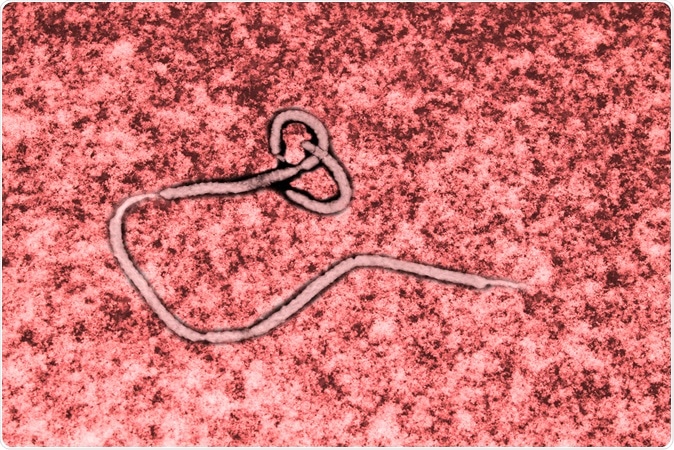A female baby was diagnosed with the deadly Ebola when she was only six days old. According to the health officials in the Democratic Republic of the Congo (DRC), she seemed to have miraculously recovered from the viral infection.

Ebola virus seen under a microscope. Image Credit: Studio_3321 / Shutterstock
The baby named Benedicte was infected with the Ebola virus from her mother who died of the infection while giving birth to her. She was born on 31st October 2018. Within a week Benedicte was found to be positive for Ebola. Since then she has been in intensive care and was treated round the clock at the Ebola Treatment Center in Beni, until she was found to recover fully. She was discharged from the hospital and her aunt and her father took her home last week Wednesday.
Ebola infection leads to high fever, diarrhea, vomiting, intense muscle weakness, and severe and serious internal and external bleeding that often lead to death. The death rate with this infection is as high as 50 percent and according to experts children and babies are least likely to survive this infection. Humans are often infected from infected apes, fruit bats and antelopes. A person remains infective for up to seven weeks after recovery during which time the virus remains in their blood and body fluids.
DRC is gripped in an outbreak of Ebola infections that has seen 27 cases of the infection in children under the age of 1 year till date. Of these 21 babies succumbed to the infection. Benedicte is youngest baby with this infection and she survived it. She is now called the “miracle of Beni”. Beni also remains one of the worst Ebola affected regions.
DRC has recorded 515 cases of Ebola in this outbreak that has killed around 330 individuals. The World Health Organization has called the situation “concerning” and has said that the outbreak is likely to spread further. Several experimental Ebola drugs and vaccines are being tried in the affected regions.
Rapid test for Ebola detection
At present there are no rapid tests to detect Ebola. Blood samples from the patient are sent to the labs that often take several days to come up with a result. This period allows the infected person to spread the infection to the community.
Now researchers have come up with a small portable rapid test using a portable device. It can detect Ebola virus in the sample in less than 30 minutes. Results of the trials with this device have been published in the latest issue of the journal Science Translational Medicine.
The device has been tried on samples from monkeys as well as humans and has been seen to identify the virus with 90 percent accuracy. The rate of false negatives is only 2.1 percent say the researchers. The test also detects malaria and Lassa fever along with Ebola making it more useful in detecting cause of fever in a patient.
The researchers used 190 samples collected from the 2014 West African Ebola outbreak along with 163 samples positive for malaria and 233 samples that did not have any of the infections. Malaria was detected accurately 100 percent of the time with a false negative rate of 0.4 percent.
The team writes, “Many infectious diseases present with common clinical symptoms, such as fever, which complicates diagnosis at the point of need... We] developed an assay using surface-enhanced Raman scattering (SERS) nanotags to distinguish Ebola virus infections from Lassa and malaria. Although further testing is required, this assay could be useful during febrile disease outbreaks.”
The SERS technique uses beams of light that are shone through the blood samples. The particles in blood including the red blood cells, white blood cells, platelets and viral particles all bounce light in unique ways. The device can detect these unique patterns and detect the presence of the virus or malarial parasites. The device is battery operated and portable and thus is useful in rural set-ups where non-portable electricity run devices are difficult to operate.